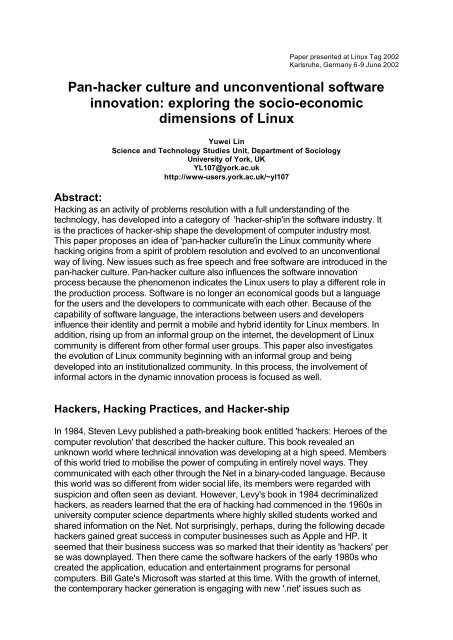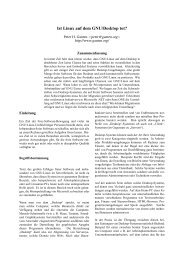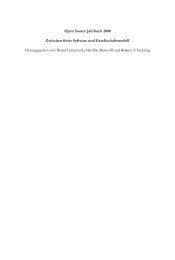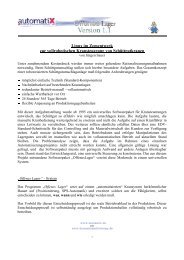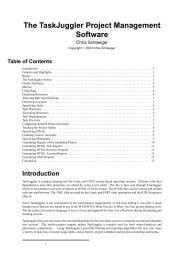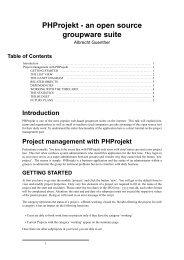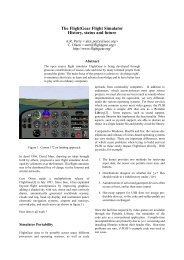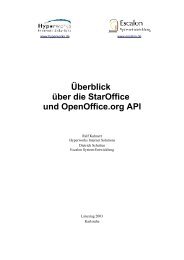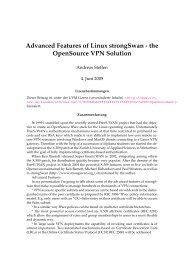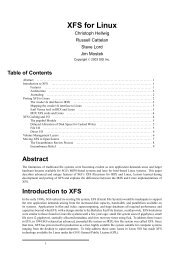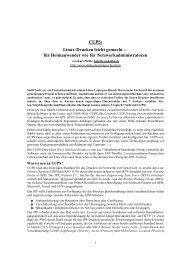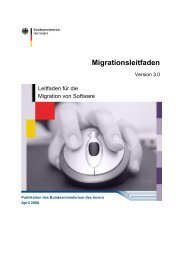Pan-hacker culture and unconventional software innovation ...
Pan-hacker culture and unconventional software innovation ...
Pan-hacker culture and unconventional software innovation ...
Create successful ePaper yourself
Turn your PDF publications into a flip-book with our unique Google optimized e-Paper software.
Paper presented at Linux Tag 2002<br />
Karlsruhe, Germany 6-9 June 2002<br />
<strong>Pan</strong>-<strong>hacker</strong> <strong>culture</strong> <strong>and</strong> <strong>unconventional</strong> <strong>software</strong><br />
<strong>innovation</strong>: exploring the socio-economic<br />
dimensions of Linux<br />
Yuwei Lin<br />
Science <strong>and</strong> Technology Studies Unit, Department of Sociology<br />
University of York, UK<br />
YL107@york.ac.uk<br />
http://www-users.york.ac.uk/~yl107<br />
Abstract:<br />
Hacking as an activity of problems resolution with a full underst<strong>and</strong>ing of the<br />
technology, has developed into a category of '<strong>hacker</strong>-ship'in the <strong>software</strong> industry. It<br />
is the practices of <strong>hacker</strong>-ship shape the development of computer industry most.<br />
This paper proposes an idea of 'pan-<strong>hacker</strong> <strong>culture</strong>'in the Linux community where<br />
hacking origins from a spirit of problem resolution <strong>and</strong> evolved to an <strong>unconventional</strong><br />
way of living. New issues such as free speech <strong>and</strong> free <strong>software</strong> are introduced in the<br />
pan-<strong>hacker</strong> <strong>culture</strong>. <strong>Pan</strong>-<strong>hacker</strong> <strong>culture</strong> also influences the <strong>software</strong> <strong>innovation</strong><br />
process because the phenomenon indicates the Linux users to play a different role in<br />
the production process. Software is no longer an economical goods but a language<br />
for the users <strong>and</strong> the developers to communicate with each other. Because of the<br />
capability of <strong>software</strong> language, the interactions between users <strong>and</strong> developers<br />
influence their identity <strong>and</strong> permit a mobile <strong>and</strong> hybrid identity for Linux members. In<br />
addition, rising up from an informal group on the internet, the development of Linux<br />
community is different from other formal user groups. This paper also investigates<br />
the evolution of Linux community beginning with an informal group <strong>and</strong> being<br />
developed into an institutionalized community. In this process, the involvement of<br />
informal actors in the dynamic <strong>innovation</strong> process is focused as well.<br />
Hackers, Hacking Practices, <strong>and</strong> Hacker-ship<br />
In 1984, Steven Levy published a path-breaking book entitled '<strong>hacker</strong>s: Heroes of the<br />
computer revolution' that described the <strong>hacker</strong> <strong>culture</strong>. This book revealed an<br />
unknown world where technical <strong>innovation</strong> was developing at a high speed. Members<br />
of this world tried to mobilise the power of computing in entirely novel ways. They<br />
communicated with each other through the Net in a binary-coded language. Because<br />
this world was so different from wider social life, its members were regarded with<br />
suspicion <strong>and</strong> often seen as deviant. However, Levy's book in 1984 decriminalized<br />
<strong>hacker</strong>s, as readers learned that the era of hacking had commenced in the 1960s in<br />
university computer science departments where highly skilled students worked <strong>and</strong><br />
shared information on the Net. Not surprisingly, perhaps, during the following decade<br />
<strong>hacker</strong>s gained great success in computer businesses such as Apple <strong>and</strong> HP. It<br />
seemed that their business success was so marked that their identity as '<strong>hacker</strong>s' per<br />
se was downplayed. Then there came the <strong>software</strong> <strong>hacker</strong>s of the early 1980s who<br />
created the application, education <strong>and</strong> entertainment programs for personal<br />
computers. Bill Gate's Microsoft was started at this time. With the growth of internet,<br />
the contemporary <strong>hacker</strong> generation is engaging with new '.net' issues such as
licensing, patents, security <strong>and</strong> privacy, all key to the development of the <strong>software</strong><br />
industry. In addition to developing <strong>software</strong> technology, <strong>hacker</strong>s in this generation<br />
also have to deal with more social <strong>and</strong> political issues than before.<br />
Reviewing the history of <strong>hacker</strong>s, an evolution comparable to the history of<br />
computers can be observed. However, the definition of '<strong>hacker</strong>' remains obscure.<br />
Though there is a Hacker Dictionary <strong>and</strong> a code of <strong>hacker</strong> (Hacker Ethics), a single<br />
<strong>and</strong> stable definition of the '<strong>hacker</strong>' is hard to give. While the majority of the public still<br />
regards <strong>hacker</strong>s as hostile, for insiders1 in the <strong>hacker</strong> communities, being a <strong>hacker</strong><br />
does not mean being exactly good or bad; rather, being a <strong>hacker</strong> means being<br />
creative <strong>and</strong> innovative.<br />
In fact, rather than seek a single definition of 'the <strong>hacker</strong>' it is more appropriate to<br />
examined hacking-type practices as they are found within <strong>and</strong> outside of the<br />
conventional world of computing. Perhaps not every insider in the computer industry<br />
would call himself/herself a <strong>hacker</strong>, but we can observe <strong>hacker</strong> practices being<br />
followed there. The practices include2 :<br />
1. Interest in tackling <strong>software</strong> problems <strong>and</strong> resolving them.<br />
2. Writing challenging scripts to explore <strong>software</strong> vulnerabilities.<br />
3. A strong interest in decryption, code-breaking.<br />
4. Writing creative scripts <strong>and</strong> sharing them.<br />
5. Developing novel hardware <strong>and</strong> sharing the proprietary information on which it is<br />
based.<br />
The first point is the classical meaning of hacking in computing. The second point<br />
specifies hacking in computer security as the third point is extended hacking to the<br />
challenge in cryptography. The fourth <strong>and</strong> fifth point are more about free computing<br />
(hardware or <strong>software</strong>). The order of the list also implies the timeline evolution of<br />
hacking from technological problem resolution in student circle to a wide range of<br />
practioners including computer professionals.<br />
What is interesting is that such practices are not peculiar or specific to the activities<br />
typically ascribed to <strong>hacker</strong>s, but might be said to characterise computer <strong>innovation</strong><br />
more generally. In this way such a constellation of practices may not provide<br />
quantitative indicators to measure the degree to which <strong>hacker</strong>s influence the<br />
development of <strong>software</strong>, but they do allow us to map the pattern of activities that<br />
have played a central role in the ongoing development of innovative <strong>software</strong> (<strong>and</strong><br />
indeed operating systems), <strong>and</strong> where <strong>and</strong> when these activities are found within <strong>and</strong><br />
outside of conventional, mainstream computing. Because these practices can be<br />
readily found among the majority of insiders in the computer world, this might give us<br />
a chance to observe what I would like to call'<strong>hacker</strong>-ship'3, an activity that is much<br />
more extensive than conventionally assumed, <strong>and</strong> suggests points of contiguity <strong>and</strong><br />
overlap between mainstream <strong>and</strong> 'outsider'4 <strong>innovation</strong>. This overlap has, in fact,<br />
been increasingly seen to be important in a number of areas where new technologies<br />
are involved, notably in the case of innovative health technologies. It is this<br />
phenomenon I want to explore in this paper, <strong>and</strong> do so through the development of<br />
Linux as a system that occupies a dual site within <strong>and</strong> outside mainstream<br />
computing.<br />
The development <strong>and</strong> operation of Linux has its historical roots in hacking <strong>culture</strong>.<br />
Actually, several open source programmers such as Eric Raymond, Richard Stallman
<strong>and</strong> Linus Torvalds have declared themselves to be pioneering '<strong>hacker</strong>s' in their<br />
publications 5. Linux is a good example of hacking evolution. Linus Torvalds began<br />
Linux as a hack; he wanted to play with Minix with a new hardware platform<br />
previously unknown by Minix. So, Linus wrote his own version of Minix. It was in<br />
1991. Then, he put it free on the Internet <strong>and</strong> a lot of people put things in it, <strong>and</strong><br />
resolved some problems. Linux is the product of <strong>hacker</strong> team-work. Being a Linux<br />
user is similar to being a <strong>hacker</strong>: the user is willing to write creative programmes <strong>and</strong><br />
to share information (source code). I would like to call this phenomenon a 'pan<strong>hacker</strong>'<br />
phenomenon. Users in the Linux community have been living with the pan<strong>hacker</strong><br />
<strong>culture</strong> since the very beginning of Linux. I want to argue that this pan-<strong>hacker</strong><br />
<strong>culture</strong> has played an important role in shaping <strong>innovation</strong> in the <strong>software</strong> industry.<br />
<strong>Pan</strong>-<strong>hacker</strong> <strong>culture</strong><br />
As mentioned above, a <strong>hacker</strong> can be explained broadly or narrowly, inclusively <strong>and</strong><br />
exclusively. According to most of the insiders in the <strong>hacker</strong> communities, a <strong>hacker</strong> is<br />
the one who writes programmes using <strong>unconventional</strong> <strong>software</strong> engineering<br />
methods, improving the efficiency <strong>and</strong> speed of already-existing programs, <strong>and</strong> who<br />
regards programming as a form of fun or entertainment.<br />
Linux originates from the idea of open source <strong>and</strong> gain collective efforts from diverse<br />
<strong>hacker</strong> users. Programming for the Linux developers was a hobby 6. Linux was<br />
created on their leisure time. For these experts, they are <strong>hacker</strong>s without doubt. But I<br />
would like to argue that, Linux end-users, from the broad meaning of <strong>hacker</strong>, can be<br />
called '<strong>hacker</strong>s' as well.<br />
Being a <strong>hacker</strong>, you have to be akin at learning new knowledge <strong>and</strong> embracing new<br />
technology 7. When Linux appeared to be an <strong>unconventional</strong> operating system in the<br />
very beginning, general users tended to stick on the original system that they were<br />
familiar with, such as Microsoft. Surely this is from the very human nature to be<br />
stable. However, curiosity is another human nature. Some people prefer adventure to<br />
sweet home life. They take the first step <strong>and</strong> try Linux. To be a Linux user, one has to<br />
know the basic program knowledge because the UNIX-type system all relied very<br />
much on language comm<strong>and</strong> input rather than mouse-click input. Therefore, to meet<br />
the requirements, an outsider of the computer science must learn programming. In<br />
addition, Linux is a new system; new program <strong>and</strong> new application are renewing <strong>and</strong><br />
adding quickly. To catch on the innovative pace, one must update his/her knowledge<br />
very often. Moreover, because of the open source trait, Linux contributors get<br />
information <strong>and</strong> add information almost limitlessly. More information is generated on<br />
the Linux engineering process. Linux users must work hard enough to operate Linux<br />
adequately. Well, if one just takes Linux as a hard work on <strong>software</strong> learning, he/she<br />
would get frustrated easily <strong>and</strong> drop out of the group straightforwardly. Being a<br />
member in the Linux community must be a joy so that one can have sufficient<br />
motives keeping enthusiastic at Linux process. These are the reasons why an<br />
general Linux user is a <strong>hacker</strong>.<br />
As a whole, the Linux community is constructed as a pan-<strong>hacker</strong> <strong>culture</strong> by its<br />
developers <strong>and</strong> end-users.
The hybrid identity<br />
Generally speaking, both developers/innovators <strong>and</strong> end-users belong to the user<br />
category. However, in Linux community, the boundary between<br />
developers/innovators <strong>and</strong> users are finer than others. In fact, a Linux user can have<br />
a hybrid identity as both an end-user <strong>and</strong> a developer. In an open source community,<br />
information is distributed freely. Therefore, one can be both an information-receiver<br />
<strong>and</strong> a contributor; one can be an end-user of other people's program, <strong>and</strong> contribute<br />
to modify the program then re-distribute it again. The Linux users are 'perpetual<br />
novice' 8, <strong>and</strong> also experts/insiders. This cycle is processing through the on-line<br />
communication in newsgroups, mailing lists, chat rooms or even ICQ. The idea of<br />
open source enables the users to have a hybrid identity, <strong>and</strong> this ability to be both<br />
developers <strong>and</strong> users promises Linux to be a dynamic <strong>and</strong> creative operating<br />
system.<br />
Unconventional <strong>software</strong> <strong>innovation</strong> process<br />
The 'user' is the most crucial factor in the <strong>innovation</strong> process. Because of the users'<br />
<strong>hacker</strong> traits, the Linux is turning out to illustrate an <strong>unconventional</strong> <strong>software</strong><br />
<strong>innovation</strong>. While more Linux users gather to form a community, the diffusion of<br />
<strong>innovation</strong> has been happening. Diffusion is a communication process in which new<br />
ideas, opinions or products are adopted throughout a society. 'Diffusion is the<br />
process by which an <strong>innovation</strong> is communicated through certain channels over the<br />
members of a social system' 9. According to Rogers (ibid.), a technological<br />
<strong>innovation</strong> is adopted following with five stages: knowledge, persuasion, decision,<br />
implementation <strong>and</strong> confirmation. He also distinguishes five groups of users:<br />
innovators, early adopters, early majority, late majority <strong>and</strong> laggards. Linux has been<br />
developed by innovators <strong>and</strong> adopted by early adopters. Now there has been a<br />
majority of early users. In the process of Linux diffusion, there are several<br />
<strong>innovation</strong>al facts can be observed. Some of them are followed the traditional<br />
<strong>innovation</strong> rules, but some of them are <strong>unconventional</strong>.<br />
The process of Linux diffusion followed the procedure that from innovators, early<br />
adopters, early majority, late majority <strong>and</strong> laggards (maybe soon in the future). The<br />
early adopters had a low resistance (the <strong>hacker</strong> trait) therefore the diffusion rate on<br />
them was faster. Via the support of these early adopters, the critical mass was<br />
formed (Linux community) to facilitate the diffusion process. The fact 're-invention'<br />
also appeared in the development of Linux that kernel <strong>and</strong> peripheral programs are<br />
changed <strong>and</strong> modified by users in the process of its adoption <strong>and</strong> implementation.<br />
Linux community is constructed to fulfill the corresponding uses as 'a source of novel<br />
product concepts' made by lead users. The development of Linux community is<br />
exactly a socio-technical constructed model. To analyze the socio-political changes<br />
in Linux <strong>innovation</strong> process, views on the 'user representation' are employed since<br />
'user' is the most important factor in the Linux <strong>innovation</strong> process.<br />
Vedel 10 argued that the politics of technological <strong>innovation</strong> is based on the notion of<br />
the 'socio-politics of usages' 11. He suggested to analyze the intersection of four<br />
determinant factors while studying technology <strong>innovation</strong>. The four factors are<br />
technical <strong>and</strong> social logics, which group together into the concept of socio-technical<br />
configuration, <strong>and</strong> production <strong>and</strong> use logics, which together form the concept of user<br />
representation. Vedel mentioned that although the social dynamics of technological
<strong>innovation</strong>s develop through the process of socio-technical configuration, the politics<br />
of <strong>innovation</strong>s is forged through the process of representation. However, the<br />
antagonists of Vedel disagreed with him <strong>and</strong> asserted that users have difficulties in<br />
organizing themselves as pressure or lobbying groups because of 'aggregation of<br />
dispersed interests', which are sometimes conflicting if not contradictory. Pierre<br />
Chambat 12 actually said, in front of a highly fragmented <strong>and</strong> specialized technology,<br />
users tend to become rather 'atomized' <strong>and</strong> individualized without common identity<br />
<strong>and</strong>, hence, incapable to mobilize collective action. Vedel's antagonists considered<br />
users as lack of technical expertise, so they thought a number of experts <strong>and</strong><br />
spokespersons of users are emerging, who are often poorly representing their whole<br />
group. Consequently, Chambat remarked, one attends 'an assimilation of market to<br />
democracy, of users to consumers or clients <strong>and</strong> of liberty to choice'. Moreover, he<br />
highlights that 'the privatization of telecommunication companies, the deregulation of<br />
the sector <strong>and</strong> the marginalization of public services push towards the direction, on<br />
the one h<strong>and</strong>, of a debilitation of the institutionalized representation of users <strong>and</strong>, on<br />
the other h<strong>and</strong>, of a reinforcement of the image of the user as a consumer'.<br />
The formation of Linux community proves that Vedel's argument makes sense in the<br />
user-representation in the process of technological <strong>innovation</strong>. Because what Vedel's<br />
antagonists said 'users lack technical expertise' is not true among Linux users. As<br />
mentioned above, as a Linux user, one has to have <strong>hacker</strong>-ship, to be akin on<br />
learning, to be positively participate the <strong>innovation</strong> rather than passively accept the<br />
changes. Therefore, the Linux users definitely are characters of Linux community <strong>and</strong><br />
can be the perfect representation of Linux community.<br />
Nevertheless, Vedel's second argument in his 1994 publication is not the case of<br />
Linux community. From the view of science <strong>and</strong> technology studies (STS), not only<br />
the way users think of a technology <strong>and</strong> its potential uses is a result of a multiplicity<br />
of social, economical <strong>and</strong> cultural factors, but the technology is also shaped by users<br />
themselves as well. Vedel therefore said 'it is interesting to study how the producers<br />
of technology try hard to intervene on the representations of technology that the<br />
users form so as to attempt to direct the users of technology towards their own<br />
objectives'. Nevertheless, in the <strong>innovation</strong> of Linux, users can participate in the<br />
<strong>innovation</strong> process constantly due to the open source traits. The identity of users <strong>and</strong><br />
innovators/developers are overlapped with each other <strong>and</strong> form the hybrid identity.<br />
The hybrid identity enables users to have their own space in the <strong>innovation</strong> field <strong>and</strong><br />
broaden the meaning of a user. The boundary between innovator/developer <strong>and</strong> user<br />
(especially end-user) is getting blurred <strong>and</strong> soft. As long as one is competent, one<br />
can shift his identity from an user to an innovator. This mutual <strong>and</strong> active mechanism<br />
indicates a dynamic <strong>innovation</strong> system <strong>and</strong> provides the prosperous Linux<br />
community.<br />
From a chronic view, the diffusion of Linux is still complying with other traditional<br />
technological <strong>innovation</strong>s. Linux usage is stepping into the stage of late majority.<br />
Because of the reliability <strong>and</strong> efficiency of Linux, more end-users such as companies<br />
or governmental organizations choose to use Linux rather than other commercial<br />
<strong>software</strong>. This is not as of the effect of vendors/distributors' advertisements nor of the<br />
apparently cheaper price (or free price). The most important factor influencing the<br />
development of Linux is the collective <strong>hacker</strong>-ship (practices) <strong>and</strong> intense virtual<br />
communication among users in the Linux community. The spirit of information<br />
sharing brings Linux community more users. And the truth is while more users can
access to the original <strong>innovation</strong> materials such as kernel programs, they do have the<br />
more motives to renovate <strong>and</strong> the products will improve quickly diversely.<br />
Institutionalized Linux<br />
However, to allow a bigger market, to allow the laggards who lack of <strong>hacker</strong>-ship to<br />
adopt Linux, the system has to be designed more user-friendly (<strong>and</strong> still keep its<br />
reliability). In addition, to get more users <strong>and</strong> gain market power, the Linux<br />
community has to be institutionalized with licenses <strong>and</strong> vendors (this fact is<br />
happening). In doing so, an informal community of practices on Linux <strong>and</strong> <strong>hacker</strong>ship<br />
gradually gets integrated <strong>and</strong> institutionalized. Actually, open source <strong>software</strong><br />
market is still decentered <strong>and</strong> not like the case of Microsoft. Although there must be<br />
peripheral companies to help end-users with the maintain or update matters, the<br />
<strong>software</strong> market will not be dominated by Linux or a single company. Not only<br />
because there are different open source <strong>software</strong> <strong>and</strong> a lot of distributors, what<br />
distinguishes Linux from Microsoft is the diverse innovators who own a hybrid identity<br />
as both user <strong>and</strong> developer, <strong>and</strong> a core community epidemic with pan-<strong>hacker</strong> <strong>culture</strong>.<br />
The informal actors still play critical roles in the <strong>software</strong> <strong>innovation</strong> system <strong>and</strong><br />
shape the dynamics of <strong>software</strong> <strong>innovation</strong>. We should keep observing the<br />
development of Linux especially the effect of the institutionalized <strong>and</strong> commercialized<br />
market.<br />
Talking about <strong>hacker</strong> again…<br />
This paper is not suggesting that '<strong>hacker</strong>s = Linux users'. Actually, an 'identikit<br />
portrait' of <strong>hacker</strong> is not pragmatic because in reality there is no a firm sociological<br />
'photokit' of <strong>hacker</strong>. The identity of <strong>hacker</strong> is fluid <strong>and</strong> the boundary of <strong>hacker</strong> social<br />
world is soft <strong>and</strong> flexible based on a range of practices. 'Hacker' is a loose notion; it is<br />
only a metaphor which acquired a plurality of meaning in sociological discourse, <strong>and</strong><br />
the media's borrowing of the term has increased the problem of definition. I suggest<br />
not to review on the essential position of <strong>hacker</strong>s but a range of collective practices<br />
influencing <strong>software</strong> technology. This will provide us a view on how things come<br />
together in different social worlds. Linux users fosters powerful hacking <strong>culture</strong>, <strong>and</strong><br />
the ways of hacking practices are deployed to lead the Linux community into a more<br />
institutionalized formal organization. The pan-<strong>hacker</strong> phenomenon has made a 'cofabrication<br />
of knowledge <strong>and</strong> identities' possible. It proves that experts can learn from<br />
users in the wild. Users get involved in <strong>and</strong> contribute to the technology <strong>innovation</strong>. It<br />
is even more powerful in Linux <strong>innovation</strong> because users <strong>and</strong> experts are so close<br />
<strong>and</strong> mutual. Subsequently, no matter one is an user, an expert, or a <strong>hacker</strong>, one's<br />
contribution to the technological system does not depend on one's identity, but one's<br />
practices.<br />
Notes<br />
1. In this paper, the definition of 'insiders' is a person with a competent knowledge of<br />
programming <strong>and</strong> computing. In analogy, an outsider is a person who is unfamiliar with the<br />
knowledge.<br />
2. These practices were observed among actors in many fields such as 2600 London<br />
meeting, 2600 Leeds meeting, HAL 2001 conference.<br />
3. The term '<strong>hacker</strong>-ship' is in the light of the word 'craft-ship'.<br />
4. Here the term 'outsider' means '<strong>unconventional</strong>'<strong>and</strong> 'unorthodox'.
5. Raymond, E. http://www.tuxedo.org/~esr/<br />
Torvalds. L. <strong>and</strong> Diamond, D. 2001. Just For Fun: the story of an accidental revilutionary.<br />
London <strong>and</strong> NY: Texere.<br />
Williams, S. 2002. Free as in freedom: Richard Stallman's Crusade for free <strong>software</strong>.<br />
O'Reilly.<br />
6. Torvalds. L. & Diamond, D. 2001. Just For Fun: the story of an accidental revilutionary.<br />
London <strong>and</strong> NY: Texere.<br />
7. Raymond, E. http://www.tuxedo.org/~esr/<br />
8. Davis, D. M. 1997. 'The perpetual novice: an undervalued resource in the age of experts'.<br />
Mind, Culture, <strong>and</strong> Activity, 4(1), p.42-52. University of California.<br />
9. Rogers, E. 1995. Diffusion of <strong>innovation</strong>s. Fourth edition. New York: The Free Press.<br />
10. Vedel, T. 1994. 'Sociologie des <strong>innovation</strong>s technologiques des usagers: Introduction a<br />
une socio-plitique des usages'. In A. Vitalis (ed.), Medias et Nouvelles Technologies: Pour<br />
une Socio-Politique des Usages. P. 13-43. Rennes: Editions Apogee.<br />
11. Boudourides, M. A. 2001. 'The politics of technological <strong>innovation</strong>s: network approaches'.<br />
A paper presented at the International Summer Academy on Technological Studies, Austria,<br />
July 8-14, 2001.<br />
12. Chambat, P. 1994. NTIC et representations des usagers. In A. Vitalis (ed.), Medias et<br />
Nouvelles Technologies: Pour une Socio-Politique des Usages. p. 45-59. Rennes: Editions<br />
Apogee.<br />
References<br />
Boudourides, M. A. 2001. 'The politics of technological <strong>innovation</strong>s: network approaches'. A<br />
paper presented at the International Summer Academy on Technological Studies, Austria,<br />
July 8-14, 2001.<br />
Chambat, P. 1994. NTIC et representations des usagers. In A. Vitalis (ed.), Medias et<br />
Nouvelles Technologies: Pour une Socio-Politique des Usages. p. 45-59. Rennes: Editions<br />
Apogee.<br />
Davis, D. M. 1997. 'The perpetual novice: an undervalued resource in the age of experts'.<br />
Mind, Culture, <strong>and</strong> Activity, 4(1), p.42-52, University of California.<br />
Himanen, P. & Torvalds, L. & Manuel, C. 2001. Hacker Ethics. London: Secker & Warburg.<br />
Levy, S. 1994. Hackers: Heroes of the computer revolution. New York: Delta.<br />
Raymond, E. 2000. 'A brief history of <strong>hacker</strong>dom'.<br />
http://www.tuxedo.org/~esr/writings/<strong>hacker</strong>-history/<strong>hacker</strong>-history.html<br />
Rogers, E. 1995. Diffusion of <strong>innovation</strong>s. Fourth edition. New York: The Free Press.<br />
Rosenberg, D. K. 1999. 'How to make money with open-source <strong>software</strong>: making money on<br />
a free lunch'. http://www-4.ibm.com/<strong>software</strong>/developer/library /license.html<br />
Stallman, R. The GNU project. http://www.gnu.org/gnu/thegnuproject.html<br />
Stallman, R. 2000. Linux <strong>and</strong> the GNU project. http://www.gnu.org/gnu/linux-<strong>and</strong>-gnu.html<br />
Torvalds. L. & Diamond, D. 2001. Just For Fun: the story of an accidental revilutionary.<br />
London <strong>and</strong> NY: Texere.<br />
Vedel, T. 1994. Sociologie des <strong>innovation</strong>s technologiques des usagers: Introduction a une<br />
socio-plitique des usages. In A. Vitalis (ed.), Medias et Nouvelles Technologies: Pour une<br />
Socio-Politique des Usages. P. 13-43. Rennes: Editions Apogee.<br />
Vitalis, A.(ed.). 1994. Medias et Nouvelles Technologies: Pour une Socio-Politique des<br />
Usages. Rennes: Editions Apogee.<br />
White, M. 2001. 'Communities of practice'. Freepint 29. Nov. 2001.<br />
http://www.freepint.com/issues/291101.htm#feature.<br />
Williams, S. 2002. Free as in freedom: Richard Stallman's Crusade for free <strong>software</strong>.<br />
O'Reilly.<br />
Woolgar, S. 1991. 'Configuring the user: the case of usability trials. In J. Law (ed.), A<br />
sogiology of monsters: essays on Power, Technology <strong>and</strong> Domination. P. 58-99. London &<br />
New York: Routledge.


